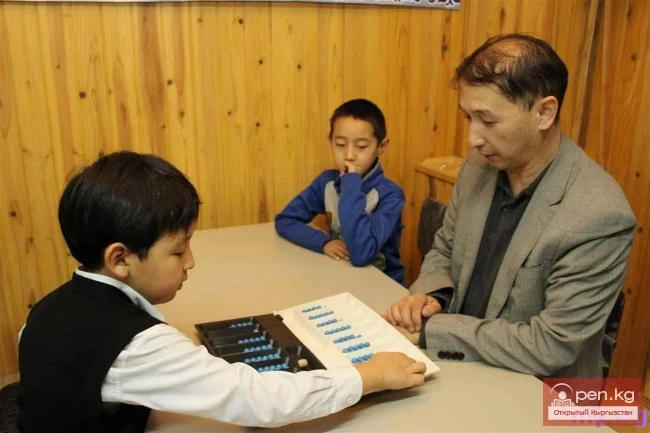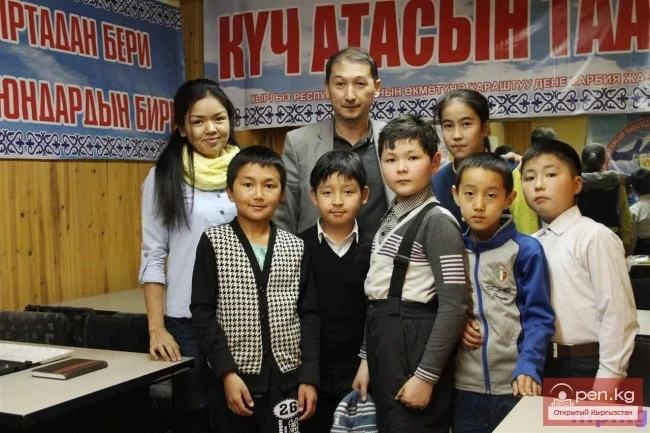Kyrgyz Chess - Toguz Korgool
Today, the director of the Sports School for National and Table Sports and the president of the Toguz Korgool Federation, Kamchybek Kasymov, will talk about this amazing game and how popular it is in the world. It is worth noting that the school he leads is under the jurisdiction of the Bishkek city administration, and education there is provided free of charge. The educational institution is located in the very center of the capital, in the courtyard of a well-known shopping center at the intersection of Toktogul and Soviet streets. Here, four national sports are cultivated: kurash, toguz korgool, ordo, kulatuu, as well as one Olympic sport, table tennis.
- Kamchybek Kasymovich, why do you think interest in national sports has increased so much in recent years?
- A powerful impetus for the development of national sports was given by our president's initiative to hold the World Nomad Games at the suggestion of the leaders of four Turkic-speaking countries: Azerbaijan, Kazakhstan, Turkey, and Kyrgyzstan, where representatives from 19 states participated on the shores of Lake Issyk-Kul. After these competitions, interest in national sports grew, especially in those included in the program. I would also like to highlight the excellent work of the federations that are conducting extensive work to develop and popularize these sports. We strive to show the whole world what types of sports were born in our country; for example, the wrestling style alysh has gained widespread recognition among the global community. Since 2000, as soon as the internet became more accessible, our programmer Kubat Kartanbaev created a computer simulator for toguz korgool, and this game spread to many countries, allowing anyone to master this ancient game. Furthermore, a year ago, Kubat Kartanbaev and Leonid Ulitsky introduced an Android version, and then the number of players increased several times; now we are working on making it possible for iPhone users to play as well.
By the way, anyone can find toguz korgool in the Play Market, and our federation has closely collaborated with the information center "Toktom," so the computer version of the game is hosted on their server. The program is small and can be downloaded in two seconds; I recommend trying it.
- But there are many similar games in the world...
- Yes, you are right. It is worth noting that there is a logical game called "kalak," which is known worldwide as "wari." There is also an African game called "bao," which is played on a similar board with balls, but it has only 32 holes. These are related games, and we want to conduct competitions among representatives of all these directions as an experiment since they are well-known and included in the program of the World Intellectual Olympics. For now, these are just plans. For the first Nomad Games, we invited athletes from Austria, Sweden, the USA, and of course, the peoples of these countries were not nomads, but they enjoy playing toguz korgool. For the next games, we will invite athletes from Poland, the Czech Republic, Slovakia, Tanzania, and Switzerland. Indeed, the Kazakhs have a similar game called toguz kumalak (togyz kumalak), which has the same rules and is included in the program of the intellectual Olympic Games held annually in the Czech Republic.
- Why do representatives of other countries enjoy playing toguz korgool so much?
- Because this game helps develop logical thinking and memory. Many use it to teach children. Little ones learn math better and show perseverance. The winner of one of the intellectual projects for youth in the Czech Republic, Andzhey Tsakh, said in an interview that toguz korgool helped him develop such memory, and this was heard all over Europe. Therefore, we would very much like this subject to be introduced in Kyrgyz schools not as part of physical education (6 hours a year), but as part of mathematics, since this game can teach children a lot, for example, counting, distinguishing sides, and of course, logical thinking. Additionally, the main rule of the game is proper posture, and the first time I sat at the board, I heard words from the coach: "If you want to play toguz korgool successfully, keep your back straight." So the first task of any coach is to seat the child correctly. Moreover, earlier, we played with balls made of wild nuts, which develop tactile memory, as the tips of the fingers are involved in the game.
- They say this game has a long history...
- A fragment of a stone board of toguz korgool dating back to the 4th century BC is kept in the historical museum in Scotland. Originally, this game was intended for military training because, to manage troops correctly, it was necessary to cultivate minds from early childhood that could count and distribute. Thus, from the age of five or six, leaders who could command an army were prepared. Gradually, the game turned into a sport. As wars became less frequent, the excitement of the game remained, and people began to play for prizes. At the beginning of the last century, the old rules were still used, but then, with the development of this game in the 1960s, the rules were improved, and now the whole world plays by the new rules that spread thanks to the internet. From 1998 to 2000, we began corresponding with representatives of other logical sports. Previously, Mongolians and Uzbeks played well, and athletes from the Czech Republic show a decent level of play. This year, the Germans demonstrated a high level, managing to win two bronze medals at the World Championship. This indicates that in the virtual game center, where mainly Kyrgyz and Kazakhs play, there are now many Germans, especially children. This portal allows for online match meetings.
- And Kyrgyzstan has a very strong national team...
- We have very strong guys, but for the third World Championship, we remain without gold medals, although we have silver and bronze awards. It is very difficult to beat the Kazakh team since they hold many tournaments; for example, if we conduct 17 competitions a year, in the neighboring republic, there are more than 50 competitions, and they focus mainly on the youth. Unfortunately, we cannot afford that yet. Unfortunately, our Ministry of Education and Science of the Kyrgyz Republic does not support us as well as it could, since the main supplier of talented players is schools. It could easily take under its wing the children's and youth teams, while the national team is successfully overseen by the State Agency for Physical Culture and Sports. Currently, we have five international-class sports masters and more than 50 active sports masters in the republic. This means that there will definitely be world champions!
PS. If we were to characterize toguz korgool in two words, it would be better to compare it: if chess is geometry, diagonals, and horizontals, then toguz korgool is pure arithmetic, where counting is essential. For example, in chess, in one second on a super-modern computer, you can check more than 50 million positions, while in toguz korgool, the computer will think for 27 minutes ahead for six moves, three years for seven moves, and will think forever for eight moves. Calculating options is very difficult. But a person has the method of exclusion and therefore always wins against the computer.
Have you ever played toguz korgool?
Read also:
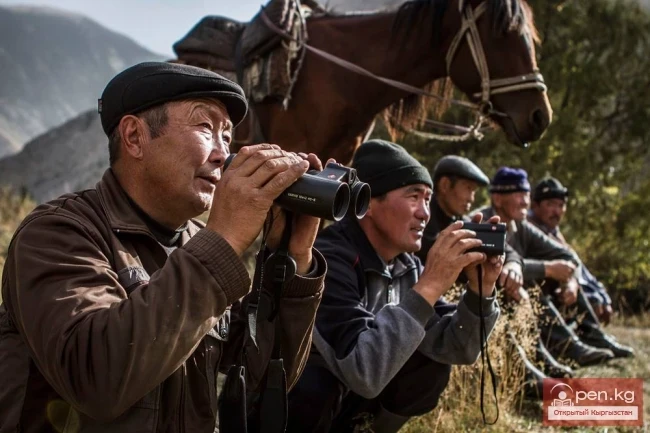
Kyrgyzstan Became the Leader of the National Geographic Tourism Ranking
Kyrgyzstan has become the undisputed leader of the National Geographic Traveler Awards 2014 in the...
Scientists have determined how many steps elderly people need to take each day
A new study published in the British Journal of Sports Medicine debunks the myth that one must walk...
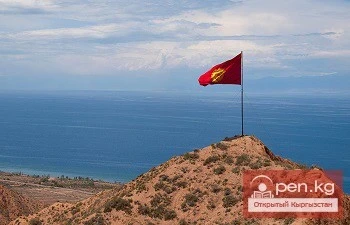
National Geographic Traveler included Kyrgyzstan in the top twenty travel destinations of 2016.
Kyrgyzstan has been included in the top twenty tourist destinations of 2016 by National Geographic...
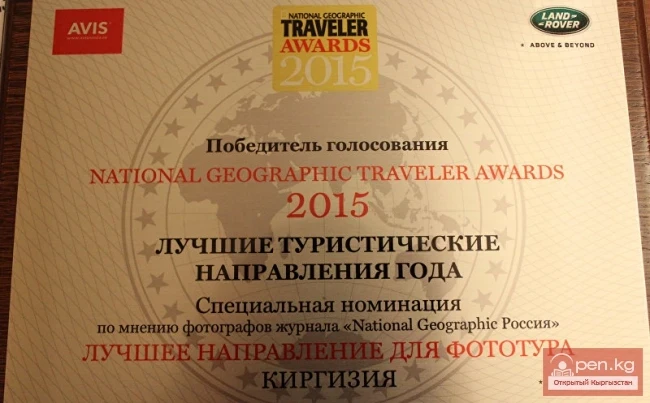
Kyrgyzstan Wins the National Geographic Traveler Contest for the Second Time
Kyrgyzstan has once again become a priority for Russian tourists. This year, the republic won in...

Kyrgyzstan Leads in the "Wellness Tourism" Category of the National Geographic Awards
Issyk-Kul topped the top 10 resorts of the former USSR for summer vacations of Russians....
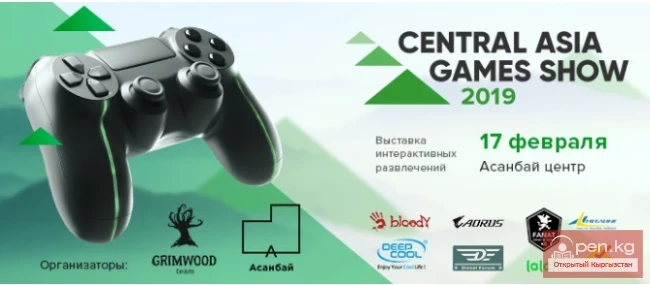
Central Asia Games Show (CAGS)
The coolest gaming event in the Kyrgyz Republic! The Central Asia Games Show (CAGS) will take...
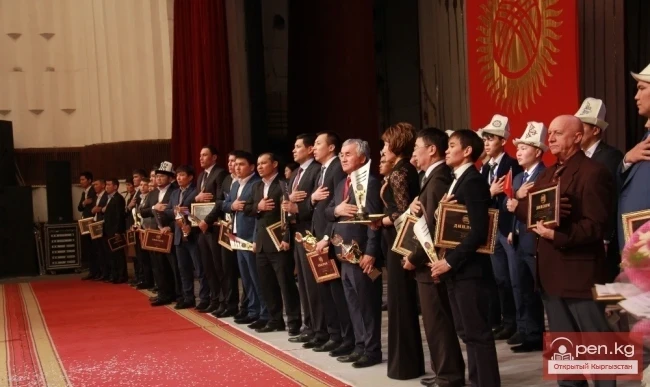
For the first time in the Kyrgyz Republic, the Sports Awards 2014 honored the best athletes.
For the first time in the history of sports in Kyrgyzstan, the National Philharmonic in Bishkek...

The magazine "National Geographic Russia" wrote about young activists from Kyrgyzstan.
The famous magazine informed Russian readers about the social photo project 'We are for the...

The International Business Council has developed a vision for the development of Kyrgyzstan's economy.
The International Business Council has developed a vision for the development of the Kyrgyz...
Ordo Sakhna Music from Kyrgyzstan of the Folk Ethnographic Theater
Ordo Sakhna – The Folk Ethnographic Theater. Biography. The folk ethnographic theater Ordo Sakhna...
Munarbek Seyitbek Uulu Takes 3rd Place in the World Boxing Ranking
Kyrgyzstani Munarbek Seyitbek uulu ranks 3rd in the updated world ranking according to World...
Toguz Bulak Ski Resort. Kyrgyzstan
The ski resort "Toguz-Bulak" is located on the northern slopes of the Kyrgyz Ridge, 40...
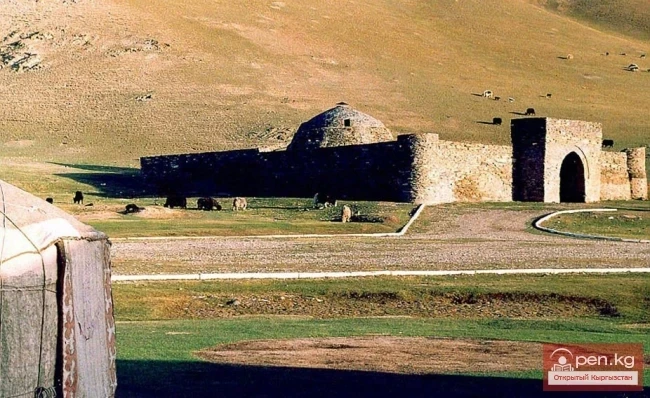
Attractions of Naryn Region
Historical-Architectural and Modern Attractions, as well as Natural-Ecological Complexes Cities...
The Beautiful Country Known as Kyrgyzstan
Kyrgyzstan is a small country bordering Uzbekistan, Kazakhstan, and Russia. The main attractions...

UFC Champion Shevchenko Responds to Intergender Fight Challenge from Cejudo
Shevchenko's Response to Cejudo's Challenge Double UFC champion Henry Cejudo proposed to...
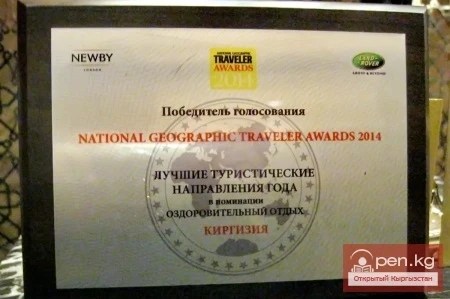
Rest in Kyrgyzstan: Top Places in International Rankings.
Rest in Kyrgyzstan has been recognized as the best according to "National Geographic,"...

Kyrgyzstan Woman Takes the Lead in Miss World 2015 Contest (Interview)
"Miss Kyrgyzstan-2015" Tatybubu Samidin kyzy has made it to the top of the "Miss...

World Economic Forum 2014-2015: Kyrgyzstan Improved Its Position by 3 Places in the GDP Ranking
Kyrgyzstan ranked 128th in terms of gross domestic product among 144 countries with $7.2 billion...
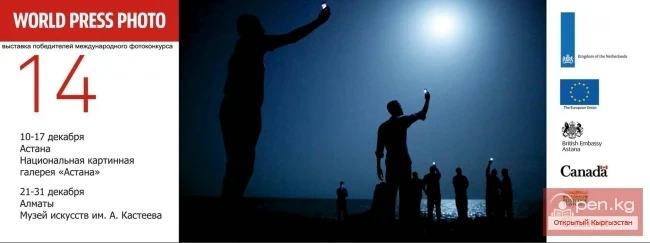
A World Press Photo Exhibition Will Take Place in Bishkek
The Kyrgyz National Museum of Fine Arts named after G. Aitiev is preparing to host a large-scale...

A football tournament in memory of Binaritdin Sultanbaev will be held in Bishkek.
From May 3 to 5, a tournament dedicated to the memory of the republican category football referee...

How Many Steps Are Needed for a Healthy Heart? Results of a New Study
A study has shown that older women who walked at least 4,000 steps one to two days a week had a...
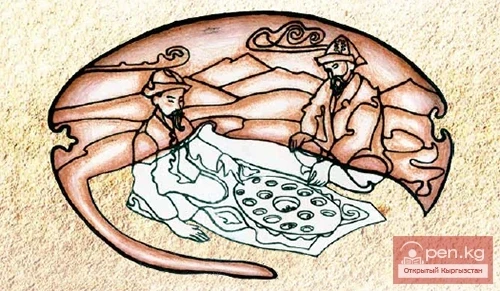
Toguz Korgol (Toguz Kumalak)
Toguz Korgool (or Toguz Kumalak) — nine balls — is an ancient Kyrgyz tabletop game that somewhat...

Munarbek Seyitbek Uulu entered the TOP-3 of the World Boxing ranking
Kyrgyzstani athlete Munarbek Seyitbek uulu took third place in the weight category up to 60 kg...
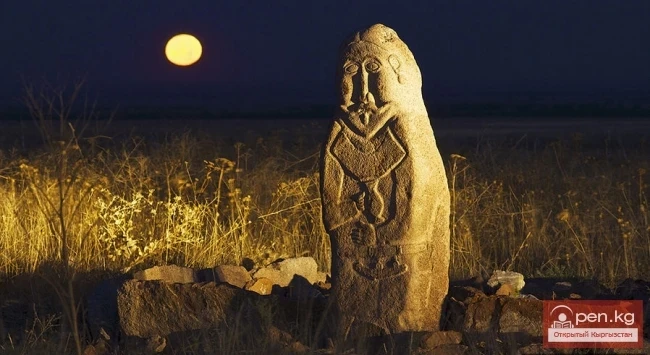
Attractions of the Chuy Region
Natural and ecological complexes: Shamsi Natural Complex Ala-Archa National Park Chon-Kemin Zone...

Summer Camp American School
Representation of the Summer Camp American School Location: Tamchy village Accommodation: 4-6...

IX International Education Fair Abroad "EXPO 2015"
The company "World of Education" is pleased to invite you to our IX International...

Attractions of Jalal-Abad Region
Nature Parks and Reserves: Relict Walnut-Fruit Forests of Arslanbob Sary-Chelek Biosphere Reserve...

Rest in Kyrgyzstan: A Pleasant Bonus for Ecotourists
Kyrgyzstan or Kirghizia – a diamond in the Asian crown of ancient empires. The country is still...

Aykol Alikjanova became the winner and titleholder of "Miss World Kyrgyzstan 2014."
Aykol Alikjanova became the winner and holder of the title "Miss World Kyrgyzstan 2014"...
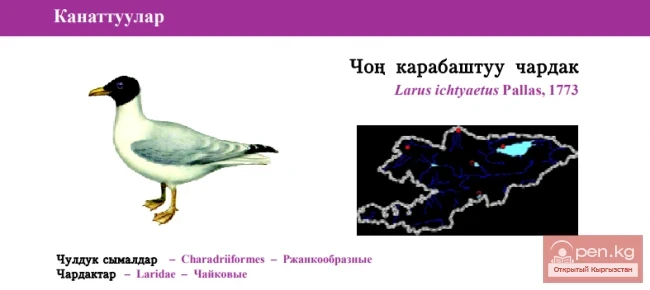
Black-headed Gull / Great Black-headed Gull
Great Black-headed Gull Status: VI, Near Threatened, NT: R. One of 6 species of the genus in the...
Former KR Greco-Roman Wrestling Coach Led Egypt's National Team to Championship
Led by Azat Erkimbaev, the Egyptian national team in Greco-Roman wrestling won the youth world...

Shopping Fest Days at Bishkek Park Shopping Center
Shopping Fest 2018 and Two Nights of Discounts! The days have finally arrived! The Shopping Fest...
Dance Flash Mob in Support of Social Justice in Kyrgyzstan
Popular dance teams Tumar, Let's Dance, and dancer Jan Voinov participated in a flashmob...
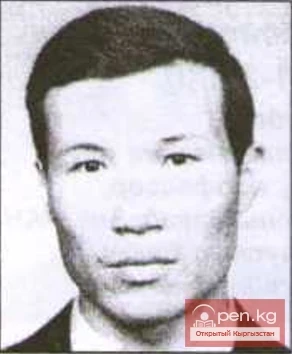
Karataev Madaminzhan Musaevich
Karataev Madaminzhan Musaevich (1962), Doctor of Medical Sciences (2000), Professor (2002) Kyrgyz....
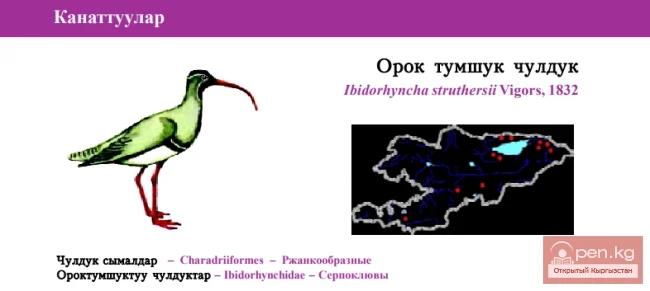
Curlew Sandpiper / Orok Tumshuk Chuldak / Ibisbill
Ibisbill Status: V category, Vulnerable, VU: R, D1. A small number of stenobiont species, at risk...

State Natural National Park "Kyrchyn"
State Natural National Park "Kyrchin" The State Natural National Park...

Anomalous Zones of Kyrgyzstan. Petroglyphs of Issyk-Kul
Petroglyphs of Issyk-Kul. Saymaluu-Tash The Ornok complex and the Saymaluu-Tash area. The clusters...

Scientists: All Languages of the World Have Common Roots
Linguists from the USA and Britain compared the meanings of the most basic and simple words in 80...
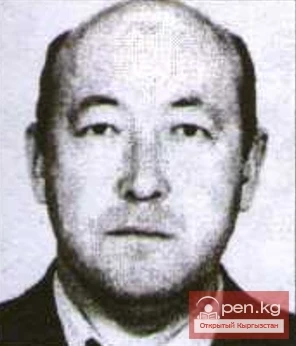
Bazarbay Satybaldievich Esekeev
Esakeev Bazarbay Satybaldievich (1959), Doctor of Medical Sciences (2001) Kyrgyz. Born in the...
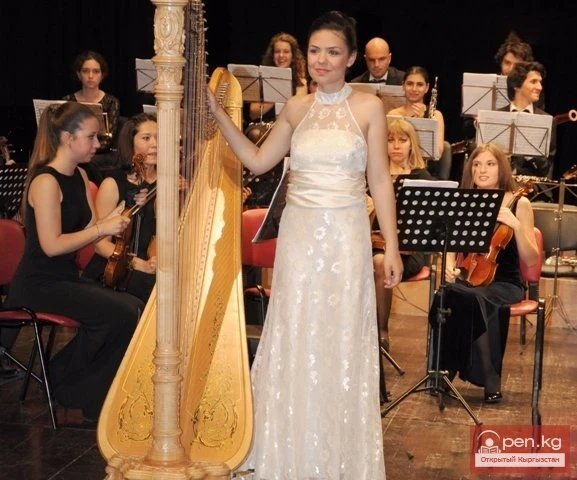
On April 30, harpist Endja Atar from France will perform.
On April 30, a concert featuring the virtuoso harpist Endja Atar from France will take place in...

In Kyrgyzstan, there are more than 1600 species of useful plants.
The flora of Kyrgyzstan is remarkable for its many endemics When discussing the flora of the...

Great Bustard
Great Bustard Status: III, Critically Endangered, CR: R, A1. The nominative subspecies Otis tarda...

Solo Concert of Ozoda
Uzbek pop star Ozoda is coming to Kyrgyzstan for her first solo concert! The singer @ozodaofficial...

Hotels Follow the Latest Sanitary Regulations
The Leading Hotels of the World follow the latest sanitary regulations Currently, the association...

Tourists will be able to stay for free in 64 countries around the world.
Hotels in different countries will host tourists for free From November 18 to 24, hotels in...
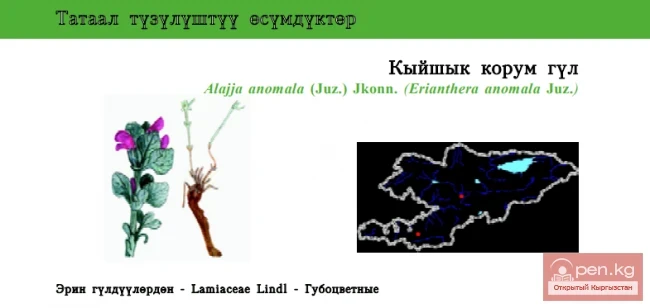
Alajja (Eryantera) Deviating / Kıyshyk Korum Gul / Anomalous Alajja
Anomalous Alajja (Erianthera anomala) Status: VU. Endemic to the mountains of Central Asia. A rare...
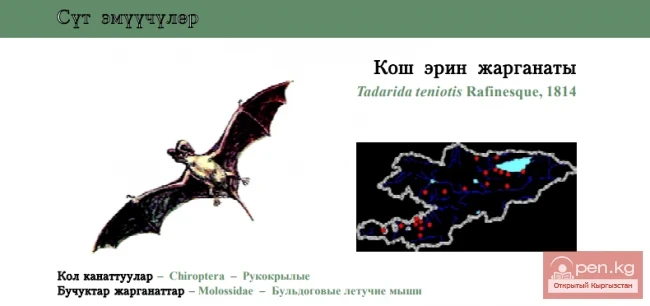
Broad-eared bat / Erin's bat / European Free-tailed bat
Broad-eared bat Status: Category VII, Lower Risk/least concerned, LR/lc....
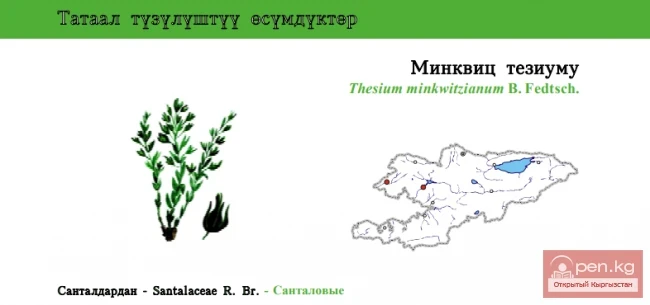
Minkwitz's Bastard Toad-Flax
Minkwitz’s Bastard Toad-Flax Status: CR. Subendemic. An extremely rare relict plant that is...
